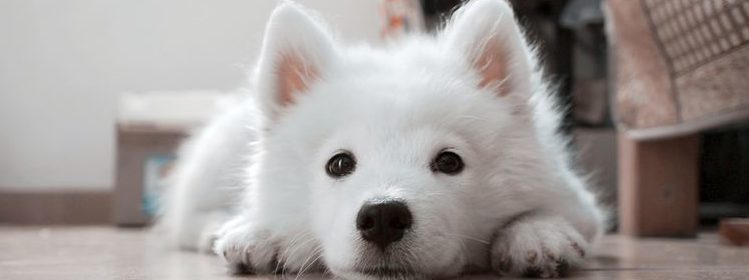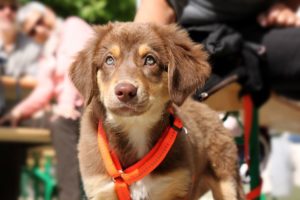10 Things You’ll Need for Your First Puppy

When adopting your first puppy, there are many things you’ll need. Some people don’t realize how much money and work a puppy can be. Don’t let your new puppy’s cuteness distract you from being properly prepared once he or she gets home.
Here are 10 supplies you’ll need for your first puppy:
1. Food
There are many brands of dog foods for you to choose from as a first-time puppy owner. The best thing for you to do for your new puppy is to research all the brands. Also, determine what your puppy enjoys eating as well as any allergies her or she may have. Allergies in dogs are very common and can include beef, egg, chicken, fish and more. Be sure to monitor your pup to determine if he or she is allergic to either of these.
To keep your dog safe when you take him or her on a walk or outside, you should purchase a leash and a collar for them to wear. On the collar, you should include a tag that states your dog’s name, your address, and your phone number just in case your pet ever gets lost. Safety should always come first when it comes to your animals. Collars do not harm your dog when the correct size is worn. The best way to assure it fits your pup well is to make sure you can fit two of your fingers underneath the collar while it is on your dog. This allows for space and comfort for your dog.
3. Crates
Keeping your puppy in a crate in the house when you are not home allows for your dog to be safe and secure when you are not there to supervise. Many dog owners find this to be especially necessary when dealing with puppies and will also help with potty training.
4. Treats
It is safe to feed your pet some treats as well as their regular food. That being said, give treats in moderation unless you are feeding your puppy training treats. To teach your puppy some tricks like sitting and rolling over, you can buy some low-calorie training treats that you can feed your puppy every time they successfully complete a trick as a reward. Since they are low-calorie, it is okay to feed a handful of them to your dog in a day.
Your dog will need a bed of its own to be comfortable in your house. If you’re looking for a bed for your pup, find something that is easily washable if your dog makes a mess and that make sure the bed is the correct size. It is fine if you purchase a large bed for a puppy if you know that eventually, the dog will grow to fit into the bed.
6. Training Bells
When trying to potty train your new puppy to go to the bathroom outside and not in the house, a good tool to use to have your pet learn this new thing is to purchase some potty bells. They are just strands that connect to your doorknob with a small bell on the end so that your puppy will learn that if he has to go to the bathroom, he can come to the door and ring the bell for you to let him out and do his business. Luckily, this simple supply is usually very cheap and can be used from puppy years to adulthood.
7. Shampoo
You will have to wash your puppy about once a month to assure that your dog stays clean and healthy. Before buying a shampoo for you to use, make sure your dog will not be allergic or have any reactions to the kind that your choose. If your dog has dry skin, then avocado shampoos and oatmeal shampoos will help moisturize their skin. There are also shampoos for helping your dog shed its extra fur and be more comfortable. Do your research and testing to find the best shampoo for your first dog.
To keep your pet happy, you can purchase a variety of fun toys for your dog. From plastic toys to plush toys to rope toys and more, toys allow for your dog to release excess energy. Always remember to monitor your puppy with toys though to ensure he or she doesn’t tear it up and choke on or eat it.
9. Food bowls
Your pet will need something to eat and drink from once you bring him home. There are tons of bowls to use, but some of the best dog food bowls are made from ceramics since they carry fewer bacteria. There are also lifts for bowls if you have a larger puppy where it lifts the food bowls up higher so your dog does not have to bend down too much to drink its water or eat its kibble.
10. Flea and tick prevention
During the springtime and summer time, fleas and ticks are most prevalent. Talk to your vet to find the correct flea and tick preventative for your puppy. Some preventatives only protect against fleas or only protect against ticks. To keep your dog safe, find a preventative that does both as well as mosquitos due to the possible diseases mosquitos carry. All dogs should have some kind of preventative to allow them to live a healthy and carefree life.
What items do you think a new puppy parent should have on hand? Leave a comment and let us know!



